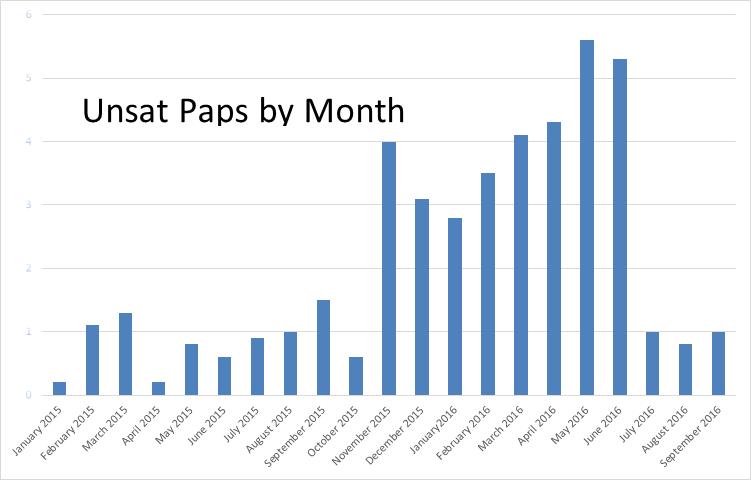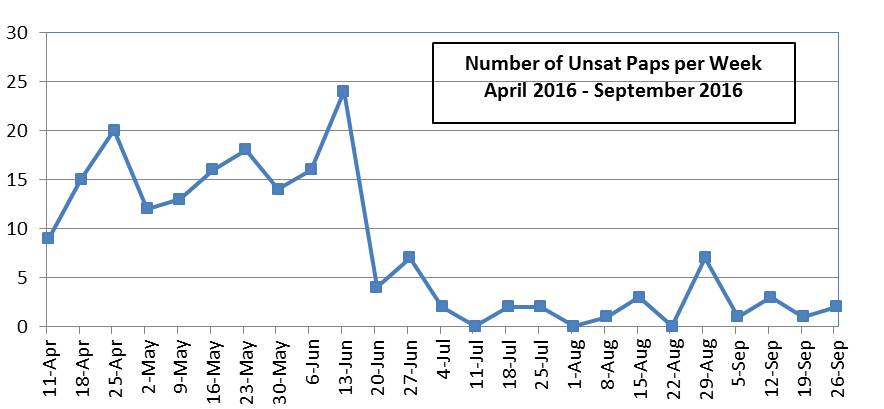Laboratory Best Practice
INAPPROPRIATE LUBRICATING GELS CAN INCREASE UNSATISFACTORY RATE OF THE PAP TEST
Alicia Calderon Bhambra DO, Cytopathology Fellow
Donald York CT (ASCP), Cytopathology Supervisor
Alaa Afify MD, Director of Cytopathology
Background: The Hologic ThinPrep© Pap Test is the most utilized methodology for cervical cytology sample collection. This methodology utilizes a homogenization and subsequent filtration process through a membrane to place the sample on a microscope slide for evaluation. It is well documented that this method can produce unsatisfactory results in the presence of interfering factors such as lubricating gels, blood and inflammation. Our department quality metrics monitors the rate of unsatisfactory Papanicolaou tests on a monthly basis and found an abrupt increase in unsatisfactory samples beginning in November of 2015. This prompted us to investigate the potential causes for this sudden rise.
Figure 1: Percentage of Unsatisfactory Pap Tests Per Month

Management: Both weekly and monthly unsatisfactory Pap Test percentage rates were calculated from January 2015 to September 2016. Cases in which an unsatisfactory diagnosis was rendered were retrieved from the cytopathology files and revaluated to determine the reason of unsatisfactory if possible. Individual providers were contacted to review their collection techniques and to determine the brand and the quantity of lubricating gel used. All providers were educated regarding the proper collection techniques and amount/brand of lubricant to be used via email, telephones and personal contact. The director of the UCD Primary Care Network clinics helped advised the faculties/staff about collecting techniques and lubricant use.
Ultimately, it was determined that the facilities experiencing a high rate of unsatisfactory Pap Test had switched to using two new brands of lubricating gels named E-Z Lubricating Jelly by Chester Labs and Lubricating Jelly by PDI, Inc. These 2 brands are not recommended by the ThinPrep® manufacturer (Hologic) since they contain carbomers and/or carbopolymers that prevent the cells from adhering to the ThinPrep filter rendering the sample extremely scant or unsatisfactory.
We recommended that those facilities should switch immediately to the lubricants recommended by the ThinPrep® manufacturer (Surgilube or PapTest lubricating Jelly from Aseptic Control Products). Figure 1 illustrates that since the implementation of Thin Prep in January 2015 the unsatisfactory rates were within the 50th percentile based on the CAP standards (below 1.3%). Rates above the 50th percentile, were observed beginning November 2015 and increased through June 2016. After implementation of the recommended brand of lubricant gels the unsatisfactory rate decreased to an average of 1% during the period of July to September 2016.
Figure 2 illustrates the abrupt decrease in unsatisfactory rates after switching to the recommended brand of lubricant gel in June.
Figure 2: Number of Unsatisfactory Pap Tests Per Week Following Change in Lubricant Gel

Sample Collection Options for Lubricating the Speculum (per Hologic):
Lukewarm Water: For a patient without physical or physiologic reasons for needing lubricant, lukewarm water may be used to warm and lubricate the speculum. This protocol has the least risk to the quality of the Pap sample collected. Professional organizations including ACOG and CLSI recognize that excessive use of lubricant may contaminate or obscure the Pap sample.
Lubricant Gels: If lubricant must be used due to patient discomfort or other circumstances, lubricant should be used sparingly and applied only to the exterior sides of the speculum blades, avoiding contact with the tip of the speculum. When a lubricant is used sparingly and appropriately, it poses little risk to the quality of the Pap sample. However, when a lubricant is used in excess, it can adversely affect the Pap sample. Hologic evaluated a variety of popular lubricants and found those containing carbomer or carbopol polymers (thickening agents) interfere with the ThinPrep Pap test when found in the sample vial. Hologic recognizes the varying availability of different types of lubricants and recommends that, if used, any lubricant should be applied sparingly.
References
Tatyana Kalinicheva, Nora Frisch, Tamar Giorgadze et al. Etiologic factors related to unsatisfactory ThinPrep® cervical cytology: Evaluation and potential solutions to improve. Cytojournal. 2015; 12: 21.
Kalinicheva T, Nazeer N, King L, et al. Frequency and etiology of unsatisfactory cervical cytology by ThinPrep method in a tertiary care urban setting – A snapshot of brief duration. Mod Pathol. 2012;25(Suppl 1):93A.
Manufacturers’ guide to cervical sample collection: http://www.thinprep.com/hcp/specimen_collection/brush_spatula.html

 LeShelle May
LeShelle May Chancellor Gary May
Chancellor Gary May